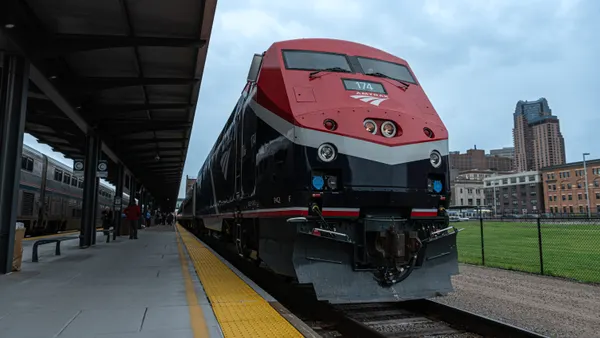Ride-hailing giant Uber unveiled a series of principles it said should guide federal infrastructure investments, as Congress continues to debate legislation on the topic.
Uber said Congress, which has been discussing the potential of a new infrastructure bill for some time, must do more. This includes prioritizing the stable condition of existing roads and bridges, expanding the use of public-private partnerships (P3s), promoting sustainable modes of transportation and embracing future technology. The company said the situation is urgent.
"America's infrastructure is not something that we can put on the back-burner," Uber’s federal affairs head Danielle Burr said in a speech at an Axios-hosted event in Washington, DC on Thursday. "We need to start addressing it today."
Uber said preserving a good state of repair for America’s roads will be crucial for ride-hailing and other modes of transportation, while ensuring that lane striping and signs are up to scratch will help with the urban rollout of autonomous vehicles (AVs) in the coming years. The company also called for enhanced public transportation funding, coming on the heels of its pledges to partner with local transit agencies to reduce personal car ownership.
AVs and electric vehicles (EVs) are also a key part of Uber’s future, and the company said government can "play a pivotal role in the acceleration" of that technology. To fund it all, Uber said Congress should look to long-term funding strategies like introducing a national voluntary vehicle-miles traveled tax (VMT). It also said that a raise in the federal gas tax should be explored, although Congress should also be forward-looking and try new alternatives.
The push comes as America’s infrastructure is in a sorry state, according to the likes of the American Public Transportation Association (APTA) and the American Society of Civil Engineers (ASCE). Burr said on average, one out of every five miles of highway pavement needs fixing or replacing, while traffic and pedestrian deaths are also rising. Surveys show Americans would be willing to pay more in tolls and fees if the money is spent on infrastructure improvements.
"We all depend on infrastructure every single day, which means we know we're failing," Burr said.
The plan received on-stage support from Clarence Anthony, CEO of the National League of Cities (NLC). He said more partnerships are needed between the public and private sectors, and when it comes to finding new ways to pay, governments should use "every tool in the toolbox."
And with AVs on the horizon, he said it is crucial for roadways and bridges to be prepared, otherwise it could spell disaster. "We can put this great technology out there, but if we don't build the infrastructure under it — the roads, the bridges and invest in that — it will be just a hollow vehicle," Anthony said. “We need to work together."
During an on-stage interview, Del. Eleanor Holmes Norton, D-DC, said she may push for Uber and its peers in the transportation technology arena to come and testify before Congress, to share their insights on how the space is changing and what lawmakers can do to try and keep up.
Holmes Norton, who chairs the House Transportation and Infrastructure Committee’s Subcommittee on Highways and Transit, said the private sector is way ahead of the curve and have left those in the public sector in their dust.
"The Ubers of this world have gotten ahead of us,” she said.












